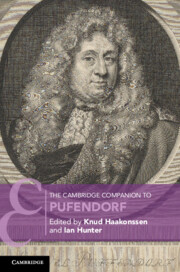(image source: CUP)
Abstract:
In the same intellectual league as Grotius, Hobbes and Locke, but today less well known, Samuel Pufendorf was an early modern master of political, juridical, historical and theological thought. Trained in an erudite humanism, he brought his copious command of ancient and modern literature to bear on precisely honed arguments designed to engage directly with contemporary political and religious problems. Through his fundamental reconstruction of the discipline of natural law, Pufendorf offered a new rationale for the sovereign territorial state, providing it with non-religious foundations in order to fit it for governance of multi-religious societies and to protect his own Protestant faith. He also drew on his humanist learning to write important political histories, a significant lay theology, and vivid polemics against his many opponents. This volume makes the full scope of his thought and writing accessible to English readers for the first time.
Table of contents:
Preface
System of references and abbreviations
1. Introduction: life, work and historical context Ian Hunter
2. Politics and the constitution of the Empire Joachim Whaley
3. Pufendorf's composite method Michael Seidler
4. The metaphysics of moral entities
5. Human nature, the state of nature and natural law Ian Hunter
6. Pacts, language and property Pärtel Piirimäe
7. Family and marriage Simone Zurbuchen
8. Pacts, sovereignty and forms of government Ian Hunter and Knud Haakonssen
9. The civil order: law, punishment, and social value Knud Haakonssen
10. The law of nations Mads Langballe Jensen
11. Polemics and controversies: regarding the Eris Scandica Fiammetta Palladini
12. State, church, toleration, reconciliation Walter Sparn
13. Political histories Sebastian Olden-Jørgensen
14. Receptions, contestations and confusions Knud Haakonssen
Bibliography.
Read more here.


No comments:
Post a Comment